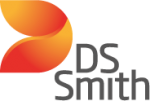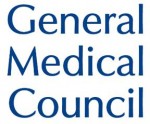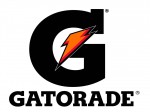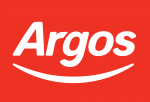Continuous improvement is central to Fuel Learning’s daily activities. The aim is to achieve quality improvements that are focused on our participants which result in positive impact on the learner experience:
• The quality of teaching, learning and assessment
• The learning environment, including resources
• Fuel Learning’s services and operations
Fuel’s organisational structure fosters a collaborative approach to achieving the business aims and enables every team member to be accountable for their
decisions. This inspires all team members to affect, implement and lead the business strategy with purpose. There are direct links made to our vision and our quality improvement plan and all individuals understand the role they play in achieving our vision.
Quality Assurance Team
The Quality Assurance team, consisting of Delivery Director, Apprenticeship Manager, Head of Quality, Head of Functional Skills and Programme Leads, are responsible for evaluating the quality of training and outcomes.
The Quality Assurance team are responsible for gathering feedback and finalising our Self-Assessment Report (SAR), clearly identifying Fuel Learning’s strengths and development areas aligned to the current Ofsted Inspection Framework and Fuel’s vision. This informs the Quality Improvement Plan (QIP).
The Quality Assurance team meet on a monthly basis to drive improvements and review our QIP and SAR to ensure we are achieving the desired outcomes and implementing any necessary changes effectively. It is important to celebrate successes and communicate these to the wider team.
Quality Assurance Framework
Information gathered from a variety of sources is used to inform quality improvements which are implemented, monitored and reviewed by the Quality Assurance Team. Information is gathered from:
• Annual self-assessment process
• Observations of teaching, learning and assessment
• Team performance reviews
• Quarterly programme content review and evaluation
• Learner, employer and stakeholder feedback
• Account Director quarterly meetings with clients
• Apprenticeship progress reviews
• Participant and team induction programmes
• Probation and mentoring scheme for new facilitators
• Awarding body review meetings
Quality Improvement Process
A cycle of review, evaluation, planning and reporting is in place to identify priority areas for continuous improvement and development. The review cycle arises from:
• Fuel Learning’s vision statement
• Strategic objectives and annual targets
• Quality Improvement Plan (arising from the Self-Assessment process) and quarterly progress reports
• Programme specific quality improvement plans
• Observation of teaching, learning and assessment
• Staff development and training plans
• Team performance reviews
• Sharing of good practice through team meetings, networking, ‘Show You Know’ sessions, Standardisation meetings etc
• Use of feedback – learner and employer surveys (Fuel, Ofsted, ESFA) complaints and compliments
• Feedback from awarding bodies and EPAO
• Formal learner reviews
• Analysis of learner data on enrolment, retention, achievement and satisfaction to identify trends and areas requiring improvements or a change in policy or
procedure
• Use of national benchmarking data to identify priority areas for improvement Quality Cycle
Areas for improvement that are identified through any of the above channels are reviewed by the Quality Assurance team and appropriate outcomes are identified, actions decided, accountability for actions agreed and all captured on the QIP.
Meetings are held to engage any departments/individuals that will need to be involved in the improvement actions.
The QIP is monitored monthly and individuals are held accountable for progress in a timely manner. The Apprenticeship Manager is responsible for reporting to the Board of Directors and updating them on the QIP progress. Regular updates are provided to the wider team to continue engagement and to equip individuals with the information needed to share with employers and learners, as appropriate.
Process Overview
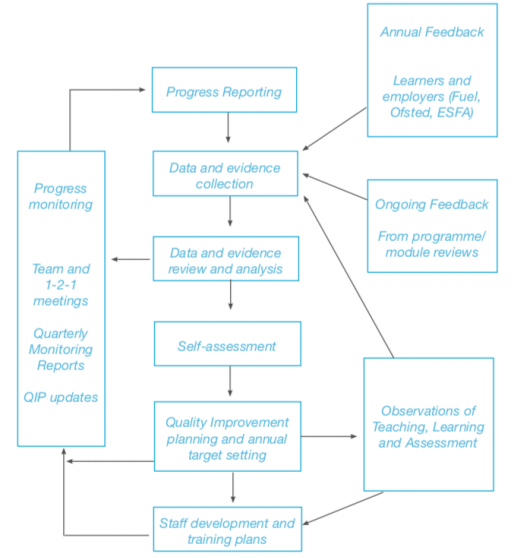
Employer and Learner Feedback Process
The main vehicles for collecting and analysing feedback are:
• The recording, monitoring and analysis of complaints using the Complaints Procedure
• Modular learner feedback
• Annual learner survey
• Annual employer survey
• Ad-hoc targeted surveys developed to collect specific feedback from learners about particular processes or activities, e.g. Equality and Diversity, Health & Safety audit.
Methodologies, procedures and monitoring details for each are detailed in the Feedback and Complaints Policy.
Learners are informed about methods of feeding back during learner induction and through the learner handbook. The Complaints Procedure is detailed in Appendix A.
In line with the Employer Engagement Policy, each employer has a dedicated Account Director who will maintain close communication with stakeholders and provide updates on improvement actions taken.
Feedback gained from learners (unless the learner has chosen to remain anonymous) will be responded to by the learner’s facilitator or quality assessor in the first instance, as the learner will have built a good relationship with these individuals throughout the programme. If it is not appropriate for the feedback to be given by the facilitator or quality assessor, then it will be managed by the appropriate head of department or programme lead.
Appendix A: Complaints Procedure
If you are unhappy with the service provided by Fuel – whether it is the learning experience, assessment, the support you are receiving or about staff or the
organisation itself – we promise to take your complaint seriously and confidentially.
We also aim to resolve your complaint as speedily as possible. If you have a complaint about any decision that we have made that affects you – if example, if you feel that you have received the wrong grade for an assessment, you should use the Appeals Procedure.
For all other issues and grievances, use this Complaints Procedure.
We are always pleased to receive compliments and complaints because they help us improve the service we provide, both for you and other learners, customers and partners. We’re also interested in your ideas for improving our service.
We use the information you give only to improve things. Passing on personal information about you is protected by General Data Protection Regulations.
If you want to complain, here’s what you can do.
It helps if you complain straight away to the people involved, as they may be able to put things right immediately. You should make your complaint within 3 months of the event or problem occurring.
At any stage, you can register a formal complaint by any of the following methods:
• By telephoning 0121 651 1200 and speaking to Sarah Webb, Operations Manager
• By sending a letter to Fuel Learning, 8 Villier’s Court, Copse Drive, Meriden Business Park, Coventry, CV5 9RN
• By email to sarah.webb@fuellearning.com
Give as much information as you can, including times, dates, places and names. You will get a full response within two weeks of receipt of your complaint.
If you still aren’t satisfied, you can make an appeal, in writing if possible, to the Managing Director, Ian Prentice, at the address above. He will investigate further and respond to you, usually within 5 working days of receiving your appeal.
There is a final stage that you can go through if you are still not satisfied after appealing to the Managing Director; you can appeal to the Education and Skills Funding Agency but they won’t handle your complaint unless you have tried all the other routes first, and still aren’t satisfied.
You must contact the ESFA within 3 months of getting a decision from us and you should contact them either, by email at: complaints.ESFA@education.gov.uk
Or by writing to them at: Complaints Team, Education and Skills Funding Agency, Cheylesmore House, Quinton Road, Coventry, CV1 2WT.
The ESFA will acknowledge your complaint within 5 days and will let you know what will happen next.








